Heat Signature Review: The Great Spaceship Robbery
The developer of Gunpoint returns with another game focused on espionage.
This article first appeared on USgamer, a partner publication of VG247. Some content, such as this article, has been migrated to VG247 for posterity after USgamer's closure - but it has not been edited or further vetted by the VG247 team.
It was a perfect run. I had latched on the ship occupied by my target. Through judicious use of two types of teleporters, one time-slowing Slipstream device, and a handy wrench, I made it rather close to my target. I was a few rooms away planning out my next action, when the ship I was in entered hostile territory.
The ship was attacked, leading to the very room I was in being completely destroyed, sucking my character out into the vacuum of space. No problem, no problem. Stay calm. I pause the world and take control of my entry pod, the device I use to attach to bigger ships like a lamprey. I have 30 seconds to scoop my floating body up before the void takes me.
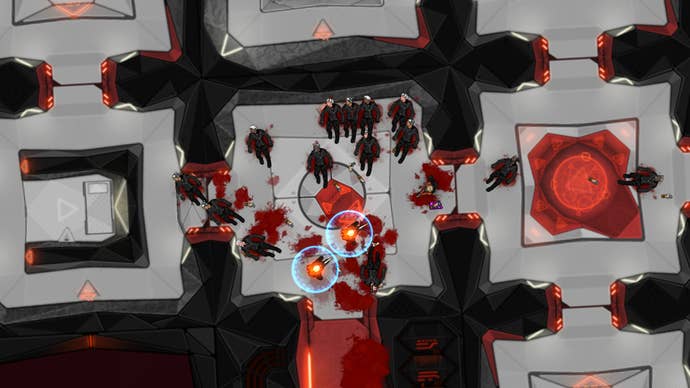
I bring the pod in alongside my body, pick myself up, and then swing back around to my target ship. I re-enter the ship through a new doorway, a hole in the hull opened by the attack, knock out my target, throw them in my pod, and head back to home. Job's done.
I'm playing Heat Signature, a new science-fiction heist title from Tom Francis, the indie developer who brought us Gunpoint. Gunpoint was very much a title about espionage and Francis hasn't really changed his focus here, just increased the scope. Heat Signature drops the side-scrolling play of Gunpoint for a top-down presentation that will remind you of Hotline Miami, especially with the up-close-and-personal violence. This is a different style of game though.

Here's the loop of Heat Signature: you pick a randomly-generated character on your friendly space station. You don't control a single character; instead of Heat Signature is a loop of taking a character as far as you can before their retirement or death. You're never truly attached to any one of them. You grab a job—steal something, kill someone, or rescue someone—maybe buy yourself some new gear, and then you clamber into your pod and fly towards your target.
This part of the loop is my favorite, the bit that never gets old for me. Like the cinematic train heists of old, you have to approach the ship containing your target and then match your speed and trajectory to attach your pod to the airlock, while also staying out of sensor range. Once you've attached to ship, you jump to the action side of the game.
In top-down play, you're wandering the procedurally-generated corridors of a ship. There are rooms full of guards. Some guards are normal, some carry keys. Others have armor or personal shields, or they can track heat signatures (as the game's title comes into play). Sometimes you'll run into turrets. Occasionally, there will be timers, meaning you'll have to make a mad dash and kill the pilot of the ship or face capture.
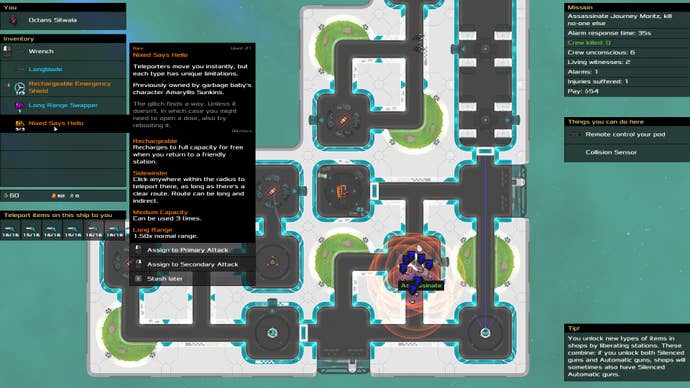
The flip side of the on-ship segments are the tools at your disposal. Like the ships, the weapons are randomly-generated. You'll start with simple wrenches, handguns, shotguns, and swords with various modifiers: a nearly-silent shotgun or a quickfire pistol that has a smaller delay between shots. Eventually, the weapons at your disposal will balloon out. Shields protect you and reflect projectiles; Swappers let you change place with an enemy or a corpse; Crashbeams turn off turrets and shields; Slipstream devices slow down time. There's even more beyond that, making for a smorgasbord of espionage items.
The weapons—of which you can equip two—are underpinned in on-ship combat by the pause system. At any time, you can pause the game. When paused, you can switch weapons, set up traps, or change your course. While Heat Signature shares the same love of immediate cartoon violence as Hotline Miami, pausing slows everything down and adds a more methodical strategy back into the equation. How you use the wide variety of weapons and the pause system together is what makes the game fun.
Let's say there's a room of four guards. One of them has a key you need, but two of the others are fairly tough customers with shields. You use a Swapper, which causes you to switch places with one of the shield guards for a few seconds. You use a Subverter on the other shield guard, reversing his shield so his bullets bounce back at him. He kills himself. You pause and switch to a Longblade, dashing in to kill the other two unshielded guards. The Swapper time limit runs out, returning you and the last guards to your original positions. You pause again, switching to your Crashbeam. You run into the room, disable the guard's shield, and then kill him with your Longblade.
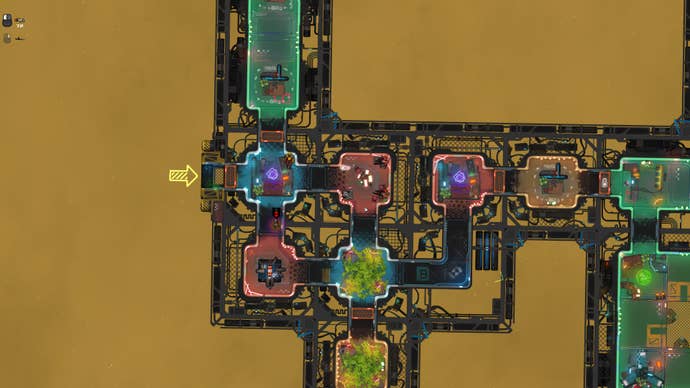
And that was just one way to solve one room. The rooms will be different in your game. The guards will be different. You may not have the same weapons. You'll find some on ships or the corpses of guards. You'll find others by liberating space stations, which increases the available weapons and gear at friendly shops.
You build up to space station liberation power by finishing missions. Once you've maxed it out, you pick a station and it joins your side. While the space stations are physical spaces, they're also your tech tree. Different stations in different regions of space unlock certain varieties of gear. Stations in Glitcher space unlock teleporters and weird gadgets, while Offworld Security stations unlock non-lethal weapons. It's a physical map that also acts as a soft tech tree for the player.
The early stations also open up new mission types: Bloodless missions want you to not kill anyone, Silent missions have to be done without raising an alarms, or Pacifist missions say you can't harm anyone but the target. These mission clauses add new wrinkles to the game's base play and additional monetary rewards if you complete them correctly.
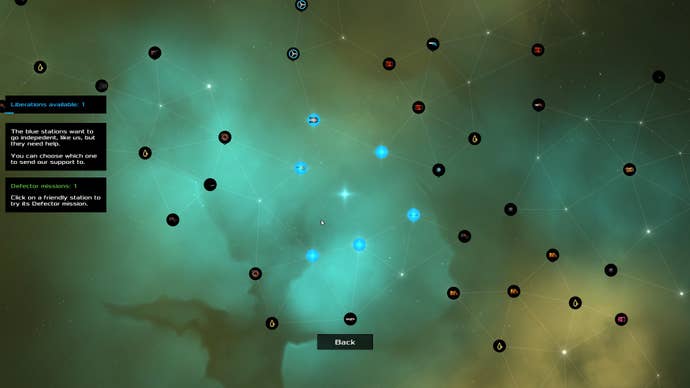
There are a few issues with Heat Signature though. The major problem with is its endgame. Each character has a soft endgame in the form of a personal mission, which sends them into retirement once they're completed, but the overall goal is capture these Strongholds in each of the four sectors of space. The problem is these Strongholds are at an insanely high level of difficulty in comparison to the main game. Part of that is grinding your way through liberations to get there, but the rest is actually completing them. You'll throw away characters on these levels, which feeds into the second problem.
There's little in the way of shared resources between characters. Money doesn't carry over and neither does your Stash of extra weapons. The only thing that carries over is the unlocked stock on your friendly space stations, but since a new character doesn't start with any money, it rarely matters. This means you're sort of disincentivized to complete harder missions the higher up you get with a character. In fact, I would choose only missions I knew I could beat instead of challenging myself because I wanted to keep the cool stuff I had on a certain character. I wish there was a bit more shared between characters, as that would lessen the sting of death and offer more chances for experimentation.
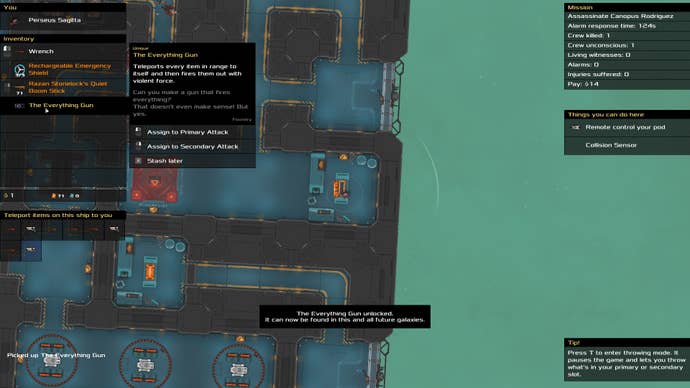
What you're left with is a game that many players will get around 10-15 hours out of before being shut out behind a vicious skill wall. Until that point, every player will run into some amazing moments that beg to be shared with friends. Heat Signature is a machine for watercooler talk. And if you're up to the challenge, there's a mountain waiting to be surpassed here. I just wish there were a few tweaks that would allow Heat Signature's fun to continue on for everyone, not just the highest skilled folks among us.
ConclusionHeat Signature looks like Hotline Miami to the untrained eye, but this is a game that rewards planning more than violence at a breakneck pace. Sneak your way onto procedural-generated ships and use a wide variety of gear to maim, steal, swap, teleport, decrypt, and simply break your targets. Heat Signature provides some amazing watercooler moments, but eventually players will hit a pretty high difficulty wall and the game punishes failure hard. Until then, there's a unique stealth action title to be found here.

